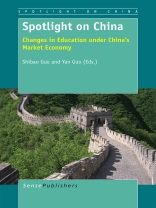Fuelled by forces of globalization, China has gradually shifted from a centrally planned economy to a socialist market economy. Under the market economy China has experienced a massive and protracted economic boom. It is not clear however whether recent economic changes have brought the same miracle to education in China. Spotlight on China brings together established and emerging scholars from China and internationally in a dialogue about the profound social and economic transformation that has resulted from the market economy and its concomitant impact on education in China. The book covers a wide range of topics, including:
• Market economy and curriculum reform
• Teaching under China’s market economy
• Changes in higher education
• Transitions from education to work
• Market economy and social inequality
With its broad scope and fresh critical perspectives, this collection offers a most contemporary and comprehensive analysis of possibly the largest education system in the world. Lessons learned from the China experiment will inform researchers and educators about social and educational reforms in other countries which are undergoing similar fundamental changes.
Spotlight on China provides a state of the art picture: dynamic, partial, full of contradictions and tensions, and, as we speak, in movement and local reconfiguration.” – Allan Luke, Queensland University of Technology.
“The book moves social science research on China’s education another step forward by refining the balance between the viability of mainstream western concepts and the analytical possibilities of creating a new scholarship based on a deeper understanding of the historically grounded realities of contemporary Chinese education.” – Gerard A. Postiglione, The University of Hong Kong’
Tabela de Conteúdo
Foreword.- Changes in Education under China’s Market Economy: An Introduction.- Section I: Market Economy and Curriculum Reform.- Neo-Liberal Education Policy in China: Issues and Challenges in Curriculum Reform.- Social Change, Citizenship, and Citizenship Education in China Since the Late 1970s.- English as a Foreign Language Curriculum Reform in China: A Study in Reconstructionism.- Ambivalent “Quality” and the Educational Sublime: Curriculum Reform Meets Ethnic Rural Development in Southwest China.- Shadow Education: The Rise and Implications of Private Supplementary Tutoring.- Section II: Teaching under China’s Market Economy.- Teaching under China’s Market Economy: The Experience of Migrant Teachers.- The Impact of the Market Economy on English Teachers.- Overworked and Stressed Teachers under the Market Economy: Case Study in Northwest China.- Private Tutoring Cum Boarding Agencies and the Controlled Decentralization of China’s Education System; Section III: Changes in Higher Education; Chinese Higher Education Since 1977: Possibilities, Challenges and Tensions; Institutional Transformation and Aggregate Expansion of Chinese Higher Education System.- Massification of Chinese Higher Education: Opportunities and Challenges in a Globalizing Context.- What Does Innovation Mean and Why Does It Matter? Innovation in Chinese Higher Education in a Global Era.- Section IV: Transitions from Education to Work.- Education and Career Mobility under China’s Market Economy: A Pre- and Post-Reform Comparative Analysis.- Social Inequality in Postgraduate Transition: A Case Study of University Students in Western China.- Transitions from Education to Work: Dilemmas and Challenges of Graduate Un/employment.- Section V: Market Economy and Social Inequality.- Inequalities in China’s Compulsory Education: Progress, Inadequacies, and Recommendations.- Widening Urban Rural Divides: Examining Social Exclusion and Education Inequality in Chinese Schools.- Navigating the Aspirational City: Processes of Accumulation in China’s Socialist Market Economy.- Educating Migrant Children: The Effects of Rural-Urban Migration on Access to Primary Education.- Postscript: Policy, Markets and the Local.- Notes on Contributors.- Index.












